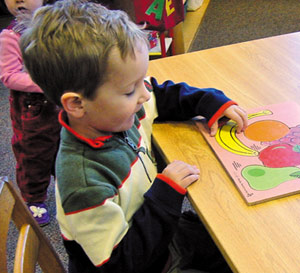|

Feature/General
The A-Z's of Choosing a Preschool
By Amy Heesacker
January/February 2006
 |
| Javi (age 4) works on puzzles in his classroom at Live Oak
Morning School |
We recently moved to Athens from
out of state. One of the most anxiety provoking parts of the move
for me was locating a new preschool for our 4 year old son, Javi.
I wanted our chosen preschool to give him an appreciation for what
school is like and help him to develop a positive attitude toward
school. In addition, I wanted his last year before "big boy school"
to be gentle, nurturing and FUN! I had quite a daunting task ahead
of me; however, I was relieved to discover that Athens offers a
wide variety of quality preschools.
Before you venture out to find the right preschool for your child
it is worthwhile to spend some time considering your needs, wishes
and goals. Knowing what you want and require with regard to weekly
schedule (e.g., drop in, part time, full time) and costs are only
two of many considerations in making your ultimate preschool selection.
What follows is a "PRESCHOOL" checklist of sorts, based on both
online research and some first hand experiences, to help you evaluate
schools and find the best fit for your child. Keep in mind that
preschools have limited spaces available and wait lists in Athens
are not uncommon, so plan ahead and start your search early.
Philosophy/Policies
Preschools often
describe their philosophies as curriculum based (i.e., academic
skills) or play based (i.e., uninterrupted blocks of play) in focus.
There are also a number of more specific preschool philosophies,
including Montessori, Waldorf, Projects, Community/Religious, Cooperative,
and Reggio Emilia (see www.scholastic.com for a brief description
of each of these). Understand the philosophy of the preschool you
choose as well as the policies that emerge from it (e.g. discipline,
parent involvement).
Ratio/Room
The National Association
for the Education of Young Children (NAEYC) recommends that preschool
classrooms have a ratio of 1:10 (i.e., 2 teachers in a classroom
of 20 children). It is also important to take a look at the layout
of the preschool room. Are there distinct areas for different activities,
and is the room a safe and inviting place?
Education
Investigate the educational
background of the teachers. Some teachers may have degrees in childhood
education while others may have specialized training in the school's
specific teaching methodology. The teachers should be skilled at
working with a preschool age group. It can also be helpful to know
the stability (rate of turnover) of the staff at the school.
Schedule
Preschool schedules may
include individual activities (self directed or teacher guided),
group activities (e.g., circle time), hands on activities/projects,
outdoor play, snack time, rest/nap period, chapel, etc. Investigate
how much time is devoted to each activity on a daily or weekly
basis.
Creativity
Some schools may provide
children with art materials and opportunities to explore them in
their own ways (i.e., process focus) while others may provide models
and directions for children to follow (i.e., product focus). Learn
the philosophy of your child's potential school and consider your
goals for your child's preschool experience.
History
Parents who have had their
children enrolled in a program are valuable resources when making
your preschool selection. Ask several parents, particularly those
who share your values and goals, about their specific experiences
with the school, classroom and teachers.
Observe
Take the time to observe
both the teachers and the students in the classroom. Do the teachers
seem engaged in the process (i.e., energetic and focused) and do
they use positive discipline techniques (e.g., focusing on what
to DO rather than on what NOT to do)? Do the children seem happy,
comfortable and interested? If possible bring your child along
to school visits so that you can observe how the teachers interact
with him/her (e.g., with warmth and respect).
Orientation period
Particularly if
this is your child's first school experience, it can ease the transition
to have an orientation period. For example, children may be allowed
to come for less than a full day and their parents may be encouraged
to come with them.
Listen to your gut!
Ultimately, this
is the strongest indicator of whether or not you have found a good
fit. Does the school feel comfortable and "right" to you? If the
answer is yes B Congratulations! You've found your child's preschool!
Amy Heesacker holds a doctoral degree in Counseling and Developmental
Psychology. She is a part- time assistant professor at the University
of Georgia and lives in Athens with her husband and their children,
Javi (4) and Isa (1).
Helpful web sites:
Signs of a great preschool
http://www.naeyc.org/resources/eyly/1996/01.htm
What is a quality preschool program?
http://www.parentingweb.com/dev_edu/qualitypresch.htm
General information about Georgia's Pre-K
program
http://www.decal.state.ga.us/PreK/PreKMain.aspx
Preschool/Pre-K Locator - searchable list
of facilities licensed by Bright from the Start (includes
information about ages served, services provided and inspection
reports)
http://www.sitesearch.decal.state.ga.us/georgiadecal/public/providersearch.aspx
|




